Plastic Shopping Bag Alternatives for Bin Liners & Ways to Reduce Waste
This website may earn commissions from purchases made through links in this post.
We know plastic shopping bags are bad for the environment, but they’re good to use as bin liners. here are some plastic shopping bag alternatives to use.
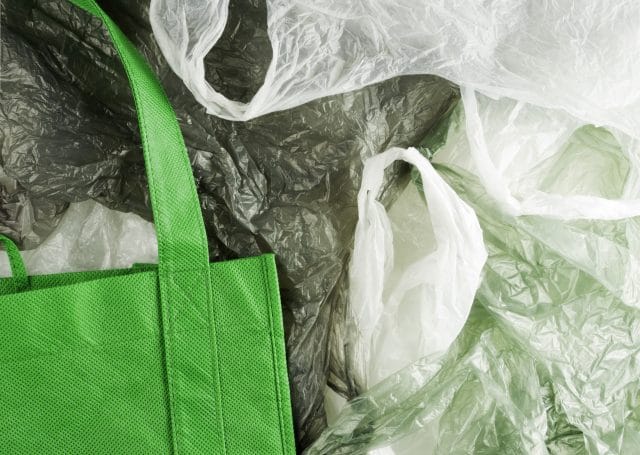
We know that plastic bags are bad for the environment.
The thing is, they make convenient and free bin liners.
So after going to the effort of using more environmentally friendly shopping bag alternatives, what do you do in place of the plastic shopping bag as bin liners?
Plastic bag alternatives
We stopped having a bin in our kitchen.
Part of the reason was to keep the ants out. But the other part was to keep our waste down too.
We still have a long way to go, but not having a bin helps you to be conscious of what you’re throwing away and exactly how much.
When you think about what most rubbish consists of (once you take out everything recyclable and compostable) it’s packaging. Specifically, we use plastic bags in order to throw out empty plastic bags. Crazy stuff.
So the real question isn’t ‘what can I use instead of plastic shopping bags for bin liners?‘, it should be ‘what can I do to minimise my waste?‘
When you minimise your waste, instead of using shopping bags to throw out empty plastic bags, you can use those bags to hold your rubbish.
For instance, you can use an empty bread bag as a rubbish bin. Or an empty frozen pea bag. Or an empty milk carton. When you have minimum rubbish, an empty milk carton for a day or two is sufficient.
Alternatively, you can go bagless altogether.
Rubbish doesn’t need to be encased in plastic. You can line your bin with a bit of newspaper or scrap paper to keep it clean and just transfer it to your otto bin for pick up day.
And you can recycle any soft plastics like bread bags through services like Redcycle.
8 Ways to reduce plastic
The best alternative would be not to buy anything in non-recyclable or non-biodegradable plastic bags, but that’s not always practical and I certainly am not at that point yet (I haven’t found a block of cheese wrapped in anything but plastic).
However, the less garbage you buy, the less you need to throw out. It does make a difference!
The little things that all of us have done for many years… It feels small, but it’s added up.”
Tim Flannery commenting on his book, The Atmosphere of Hope
It’s not easy and the responsibility shouldn’t just be on the consumer; the manufacturing and retail industries need to lift their game and reduce plastic packaging. But this will only happen when you and I, as consumers, demand it.
Here are some tips on reducing your plastic consumption:
- Store your green bags in the car. That way you never forget them.
- Always carry a small carry bag (like these ones that fold up) in your purse for just in case.
- Skip the produce bags or use reusable produce bags. Make your own from old curtains or use ones like these.
- Buy your pantry staples from the bulk bin section of your supermarket or a bulk food store. (Pro tip: If you live in pantry moth territory, freeze-dry goods like nuts and flour when you get home for 24 hours to kill pantry moths. I battled with pantry moth for years. Now I freeze everything first and haven’t had a problem since.)
- Take your own containers to the deli, butcher and takeaway store.
- Take your own coffee cup (I love my Keep Cup. I’ve never had a problem using it).
- If you can recycle the soft plastic you do get through Redcycle.
- Think about the things you buy and look for alternatives that cause less waste. For example, instead of getting individually wrapped or packaged multi-buys, buy in bulk and portion food yourself.
10 Ways to reduce what goes in the bin
The problem with rubbish isn’t just about plastic shopping bags. To eliminate the need to use them as bin liners (or to use less of them), you need to reduce your household rubbish as a whole.
- Start a compost bin or worm farm and compost kitchen scraps and scrap paper. Some councils have a compost bin they collect along with the regular Otto, why not petition your local council for the same service.
- Use your scraps to make practically free stock in the slow cooker.
- Reduce the amount of meat you eat (reduces the need to throw out the bones and it’s better for the environment anyway).
- Recycle everything that’s recyclable.
- Reuse the plastic you do use over and over (for example, I still use zip-lock bags in our freezer because they fit well. But I keep them in the freezer and use them again and again).
- Recycle soft plastics.
- Opt for reusables rather than disposables.
- Try a menstrual cup.
- Use cloth nappies.
- Make your own cleaners.
Using less plastic a small thing that we can all do that makes a big difference. And there are always practical alternatives when we think outside the box.

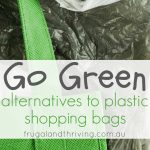
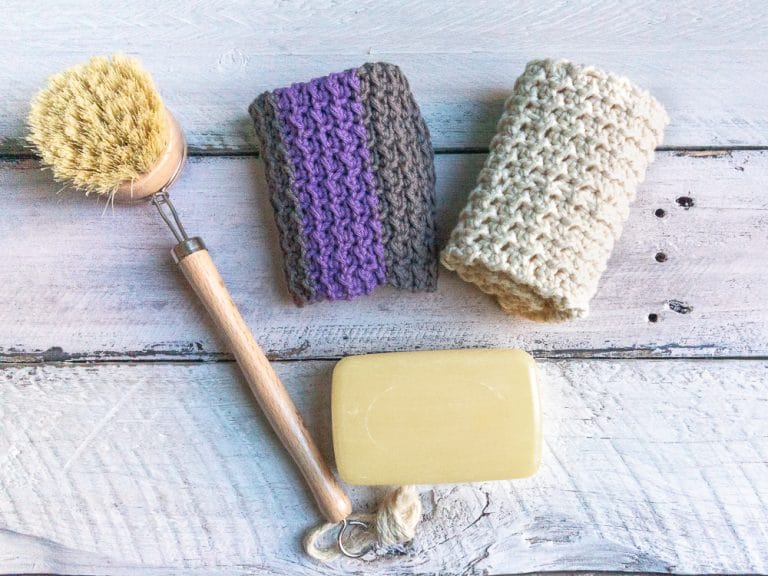
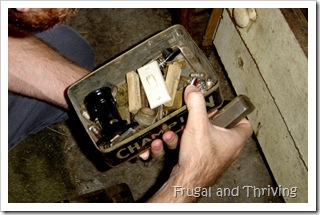
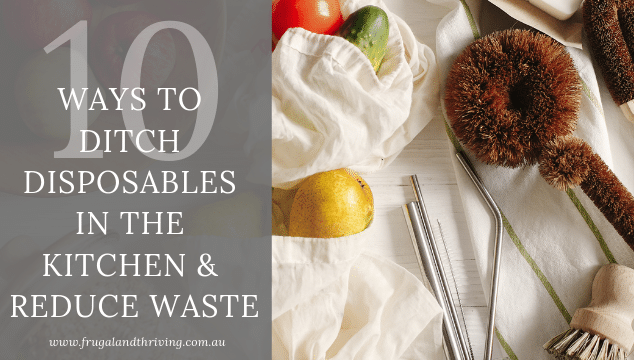
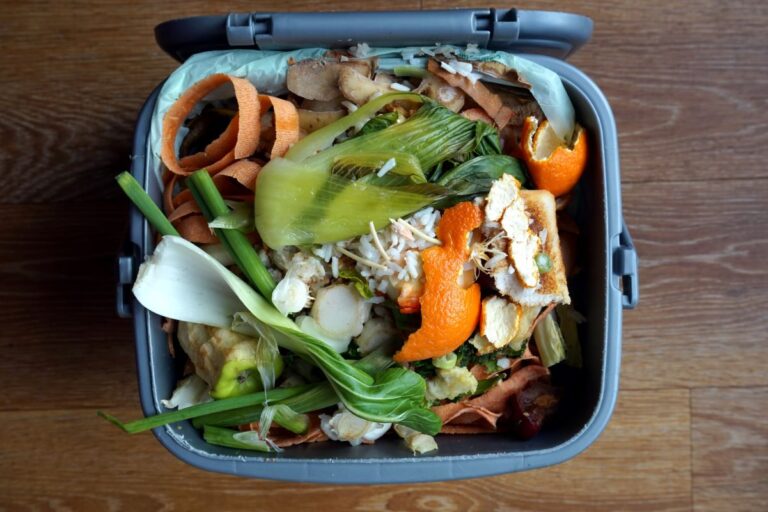
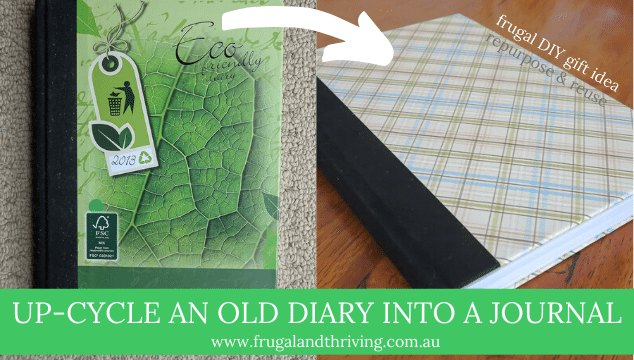
We too didn’t buy garbage bags for 14 years while we lived in our own home.
(We have not used grocery bags/sacks for 25 years now and continuing.)
Like you, we used various non-recylable packaging to store “wet” non-compost garbage within our “bare” kitchen trash can, empty it into the garbage service’s trash can kept in our garage (as well as co-mingled recyclables can), and cleaned the kitchen pale as needed.
Unfortunately now that we’re back in an apartment, we can’t compost, I have to drive weekly to go recycle (what little FL actually will take), and trash sacks are required to travel the distance to the complex garbage compactor.
Hi CheapNLazy,
Apartment living doesn’t make it easy, neither do councils! I’ve rung our local council a couple of times about their recycling system, it’s annoying that you go to the trouble of doing the right thing and the recycling just get chucked in with the rest of the garbage at council end. We live in a townhouse and the bin enclosure is getting a make over – so no recycling bins at the moment. Driving to do the recycling is very dedicated!
Hi all – I’m trying to reduce my plastic consumption in many ways too. Here are some of the things I do. I hope it helps you with ideas!
I buy anything I can from the local health food store, as they get their products in bulk (less packaging) and then you scoop it out yourself into paper bags, or your own re-used bags. I can get rice, cereal, oats, peanuts, sultanas, trail mix, even lollies this way!
Everything else I get from the supermarket, and try to get the products packaged in card, not plastic. Eg, toilet rolls in paper packaging, feminine products that come in a box, and aren’t individually wrapped in plastic!, pet food in a box. I have also found a laundry liquid who’s container is made of RECYCLED plastic, and I buy this religiously!
I buy my bread from the bakery and they put it in a paper bag for me. Then I put it in a plastic bag when I get home, which I have been re-using for about 6 months! You can wash plastic bags and re-use them.
I have also been re-using bread bags or other unavoidable plastic when I get the fruit. I think I’ve had those bags for about 3 years! Some people look at me weird, but they all nod and smile when I explain :+) I also don’t buy cut fruit that is wrapped in plastic wrap (like watermelons and pumpkins). I simply buy a whole one. If there’s extra watermelon left over, it gets mixed with yoghurt as a delicious smoothie. The kids love it. If there’s spare pumpkin, it gets grated into the spaghetti bol, or the stir-fry, or turned into soup, or as a last resort, compost.
I buy most of my clothing and shoes from 2nd hand shops, which saves on a lot of plastic packaging. (Also saves on resources, manufacturing waste, transport etc!) Infact, I buy many things from the local op shop – it even has a sport department, book shop, kids toys, furniture and electrical!
I use modern cloth nappies. Apart from the plastic saved in the actual nappy, you also aren’t wrapping soiled nappies in a plastic bag each time. If you do use disposable nappies, there’s no need to buy those plastic nappy disposal bags – just use your bread bags, rice bags, frozen veg bags etc. It will be a lot cheaper too!
I use Tupperware religiously for lunches and left-overs. We don’t even have plastic wrap in the house. I also heard of a lady who takes her own containers to the butcher, and gets the meat put straight in them. I know Tupperware is plastic, but I’m sure it’s recyclable at the end of its life, and it will stop you putting so much plastic into the environment.
I make my own yoghurt. Not only does it save on plastic containers, but it’s heaps cheaper than buying! Works out to be about $1 / lt. Sooooooooooo easy to make, too.
Funnily enough, I had to take a lot of these measures when we had children, and were living on my husband’s apprentice wage. But I won’t go back now that I’m aware just how much plastic we used to use.
Oh, and just a warning about “biodegradable” plastic. For anything to biodegrade (even your kitchen scraps) it has to sit in the top 15cm of earth. This is so oxygen can reach the micro-organisms that do the breaking-down. Unfortunately, landfill gets buried too deep for this process to occur. So biodegradable plastic is a bit of a misnomer. Even your kitchen scraps just sit in landfill turning fetid, and infact are one of the world’s biggest sources of methane (a greenhouse gas)!
As far as the bin liner goes – we are still using the plastic bags that wind their way into the house. (unfortunately, the rest of my family aren’t as committed to reducing plastic as me!) I wanted to just line the bin with paper, but my husband simply refuses.
Here’s what I’d like to try… wrap anything “icky” individually in newspaper, as you would wrap up fish and chips. Place the bundle straight in the kitchen bin. Anything dry can just sit loose in said bin. Then when full, tip it into the large council bin.
What I’d like advice on though, is how to stop the flies breeding in the council bin if the rubbish is loose like this? (We live in Qld.) This is my stumbling block with trying to convince my husband to go plastic-free.
Hi Jenny,
Wow! Thanks for all the awesome ideas. Your heads-up on the ‘biodegradability’ of plastic is really interesting too. It exactly the kind of information we need to be able to make an informed choice, so thanks.
I’m not sure about the flies though. We live in QLD too, although I think the flies here aren’t as bad here as when I lived in western NSW, but then we’re on the coast now. Do you mean bins without lids? This is the only thing I can think of. At the moment our units have a skip, and it doesn’t matter that everyone uses plastic garbage bags, there is always loose rubbish floating around (and flies – and crows who rip open the bags). I’ve seen around the net a pattern for origami newspaper bin liners which might be an alternative to keeping loose rubbish contained, and then as you said, the icky stuff gets wrapped as well, and cardboard milk containers work well too? I don’t know.
Hi Melissa. I like the origami bin-liner idea! I’m sure I could come up with a way of folding the paper if I can’t find the pattern.
As for the flies, I was referring to the green council bin (wheelie bin). It doesn’t worry me having flies in there, as I reckon they get in there regardless (just like the crows!), but my hubby is incredibly anal about flies and refuses to put loose garbage in the wheelie bin until we find a way of erradicating them!
What I’ve done in the meantime, is purchase (from said op-shop!) a small bench-top kitchen bin (with a hinged lid). It is small enough to use all the plastic packaging that our groceries come in (Weet bix inner bag, frozen veg packet, biscuit packets etc), as bin liners! Means we have to empty it more often, and it still doesn’t solve the problem of going COMPLETELY plastic-free, but it’s an inroad, and I’m still marvelling that my hubby has agreed to try it!
:+) Jenny
This is where I saw the idea of origami bin liners : http://www.wisebread.com/two-affordable-alternatives-to-small-plastic-trash-bags. I guess it’s a good thing that your hubby cares about the flies in the bin – now if I could only get mine to take the garbage out…
:+D lol!